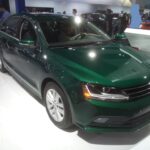Are German Cars the Best in the World? ALL Pros & Cons
In 2015, BBC did an industrial survey in the UK. Its report declared German cars as least reliable. However, all famous German manufacturers like Mercedes, Audi, and BMW were ranked in the top 10 for reliability by warrantywise. This survey was also conducted in the UK.
So, what’s the catch here, are German cars pieces of junk disguised as engineering marvels? Or are German cars the best in the world? Let’s find out.
What Features Make German Cars the Best in the World?
1. Powerful Engines
Germans have been known to produce the most powerful engines. These engines can generate high power outputs for longer periods. Their engines are lauded, even by the surveys designed to criticize German cars.
2. Engineering Miracle
The term “German Engineering” has been long used in the automobile industry to define standards and quality products. German scientists under their Nazi masters sure did some miracles in the field of engineering. They made some valuable innovations in the automobile industry. German engineering standards laid the foundation for the automotive industry capable of producing the most reliable vehicles.
Which German car brand is the best? Here’s the answer!
3. Jam-Packed Features
German manufacturers have led the features game in modern times. Their cars have been jam-packed with brilliant features. Germans have introduced the world to voice controls, advanced safety systems, driver-assist use radars, cameras, and more.
The dynamic select feature in Mercedes Benz 2019 allows one to select from 9 different transmission options. You can even create your custom mode on it.
4. Uncompromised Safety
German automakers have dominated the list of safest on-road cars. Mercedes, Audi, and BMW have been ranked 5th, 10th, and 11th respectively, among the 14 safest car brands.
German cars have to pass a rigorous crash test. They’ve installed technologies to ensure pedestrian safety rand crash avoidance. Brake assist is also added by makers to make rides a safer experience.
Read it: 10 Best BMW Diesel Engines (and Cars That Use Them)
5. Mesmerizing Aesthetics
Everyone wants their car to be reliable. But you know what people love more than a reliable ride, a fancy one. Beautiful cars are always admired by car lovers. Many car-buying decisions are based on external looks only.
German cars are loved by many due to their elegant designs. Their designs are mostly clean and minimalistic. German cars are visually attractive and have the ability to instantly capture you.
6. Soothing Comfort
Germans are renowned for the production of luxury cars. What good is an expensive car if it’s not comfortable?
When it comes to providing comfort, not many manufacturers can compete with Germans. From hand-crafted leather interior to heated front and rear seats, all-season climate control, to memory foams, German manufacturers make sure that you ride comfortably.
Trending Video: How to Easily Bring Back to Life any Old Car Battery and Save Tons of Money (click to watch)
7. Performance
Most of the cars produced by German manufacturers have very high-performance engines. Following are the top 5 German cars with the most powerful engines:
- 2015 Mercedes-Benz S65 AMG produces an output as high as 518 hp.
- Engines of BMW X5 M and X6 M can generate 567 hp @ 6000 rpm.
- Porsche 3.6 flat 6 Air Cooled engine is known to produce 444 hp.
- The power output of the S65B40 BMW V8 can go as high as 414 hp.
- 2.1 liter Audi I5 comes with an average output of 197 hp.
Are Japanese cars better than German? Find out if it’s true by clicking here.
8. Efficency
Engines of German cars are quite efficient as compared to other cars of similar segment. You cannot match the efficiencies of high-performing Audi & BMW to those of Toyota and Honda.
Still, these companies have managed to roll out some quite efficient cars. The efficiency of Audi A3 & BMW 335D can go as high as 13 km per liter.
What Makes German Cars not the Best in the World?
1. Crazy Costs
High prices of German cars have played a crucial role in the decline of their sales. Brands like Maybach have produced crazy expensive cars. One of such cars is Exelero. It is a concept car with a top speed of 218 mph. Other brands haven’t stayed behind much. Following are the names of some other expensive German cars:
- Maybach Landaulet – $1.4 Million
- Porsche 918 Spyder – $845,000
- Mercedes-Benz SLS AMG Black Series – $275,000
- Mercedes-Benz CL65 AMG Coupe – $215,500
Here’s more about why German cars are so expensive.
2. Complex systems
In an attempt to pack cars packed with features, German manufacturers complicated their systems. Most mechanics are too scared to fix a German car. Fearing that they might end up further worsening the scenario.
3. Twisted Electronics
Electronics have been the greatest point of concern for German cars. They have the worst wiring. Cars driven less than 60,000 miles have reported failure in electronic systems.
The disturbing part is that failed electronics mean you cannot enjoy most of the fancy features. Let alone enjoying the features, even the horns of German cars haven’t been working properly.
In 2015 Volkswagen had to issue a recall of its Jetta SEL. It had the horn, lights, and stereo on the same fuse, which caused major issues. The fuse was getting too hot and melted the fuse box in some cars. This is a sign of sheer negligence during the electronic design of the car.
This issue raised a serious question about the quality of German cars, as to whether they pass any electronic test at all.
Read it: Does BMW Keep Value? (8 Models Depreciation Charts)
4. Expensive Maintenance
Maintaining a German car can be costly. To begin with, spare parts of German cars are way more expensive than others.
You can’t just take your German car anywhere for repair, only authorized service centers can comprehend its complex mechanics. At these customer care centers, they take good care of you by charging hourly rates for replacing a $5 fuse.
Due to highly complex electrical systems, most mechanics aren’t comfortable with working on German cars. This means fewer mechanics and higher demand. As a result, you might end up paying hundreds of dollars in only repair costs.
5. Environmentally Un-Friendly
A car does not stand a chance in the modern-day market if it doesn’t comply with environmental standards. Various companies have boosted their sales campaigns entirely on the fact that their cars were eco-friendly.
In 2015, the Volkswagen Group landed itself in the middle of a major scandal. The German automaker was scrutinized for possibly falsifying thousands of EPA tests on their diesel vehicles. An allegation that turned out to be true. The group pleaded guilty to this charge and accepted its wrongdoings.
In a struggle to develop more economical and less polluting engines, German cars have had a negative influence on the reliability of their cars. And that seems to go for most German brands, if not all.
Also read: Quattro vs. 4Motion: What’s Better? (Comparison)
6. Poor Build Quality
To compete with cheaper Japanese and Korean cars, Germans had to compromise on their build quality. Poorer materials were used to produce cars.
This compromised quality had a detrimental effect on the reputation of German cars. Users said that everything started falling apart after a certain period.
German cars don’t survive long after the warranty expires. You’ll be extremely lucky to get even 100,000 miles out of your German-made car.
7. Made to European Standard
Do you remember a scene from the famous AMC TV series “Better Call Saul” in which lead character Jimmy McGill ends up getting a German car from his employer? And later ends up breaking its cup holder to place his coffee jar in it.
This can happen when you use cars manufactured on different continents. German cars are made to cater needs of European audiences. They are made with the climate of Europe in mind. These cars aren’t made to stand harsh tropic climates.
German cars cannot tolerate excessive heat and a dusty environment. Hence their failure in the alien condition is quite common.
8. Insurance Scams
If you own a German car, your chances of getting ripped by insurance companies are higher because insurance agents tend to have a fixed mindset towards luxury car owners.
To them, if you can own a $100,000 car, then you can surely pay premiums double or triple as that for normal car insurance. Plus, they also know that insurance is a requirement for your high-end German car. Hence, you can end up paying huge amounts of money for getting insurance.
Read it: Is it Worth to Buy Car in December? Is January Better?
9. Missing Replacement Parts
Users have reported that replacement parts for German cars aren’t easy to come by. One, they are extremely expensive, and two, they aren’t commonly available.
This problem gets ugly when your car becomes old. Finding replacement parts for discontinued models can be an even difficult task.
The issue of not finding a spare part can rise to the extent that people had to sell off their brand new German cars for pennies. Because either they weren’t able to find the spare parts, or if they did, their cost was so high that they could buy a new car for that price.
10. Deadly Depreciation
German cars can depreciate pretty fast. They lose nearly 60% of their values within the first 5 years of operation.

Are German Cars the Best in the World?
Germans were making the most reliable cars before 2005. After that, German cars have lost their charm. To pack more features, more complications were loaded onto cars. This led to a higher rate of German cars being unreliable.
What Country Make the Best Cars in the World?
Japan and Korea have beaten Germans at their own game of reliability and quality. Their cars are designed to withstand poor maintenance and worst conditions. Japanese and Korean cars have been known to last longer than 200,000-300,000 miles, which makes them the best cars in the world.






